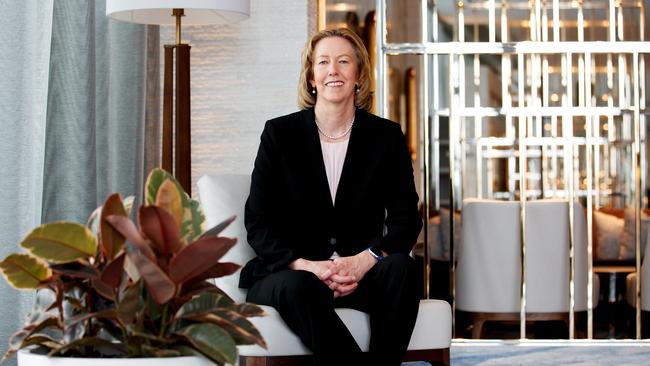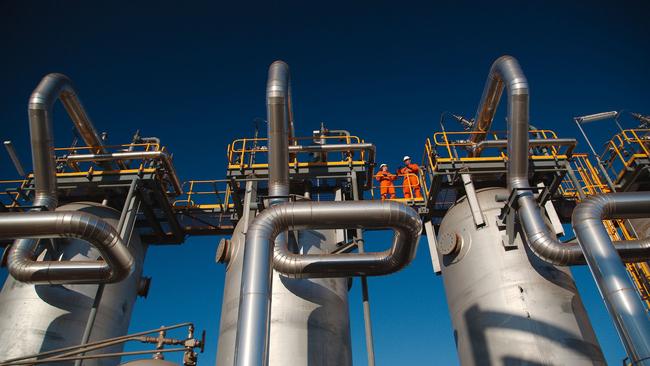Woodside calls for regulatory reform as legal cases slow new developments
Environmentalists have used legal challenges to stop work on expansion projects, and Woodside Energy said changes must be made to avoid an energy crunch.

Woodside Energy has called for urgent reform in how offshore drilling licences are granted to prevent environmentalists using legal avenues to block new projects, as oil and gas giants intensify efforts to curtail a popular and successful tactic used to block or delay new developments.
Joining a chorus of condemnation, Woodside chief executive Meg O’Neill said legal challenges have emerged in the wake of regulatory murkiness and these have the capacity to exacerbate tight global supplies.
In September, a federal court said Woodside could not begin seismic work at its $16.5bn Scarborough project – a precursor to the drilling of wells for the project – after concluding the company had adequately consulted a traditional custodian.
Woodside said the ruling will not impact its target for first LNG cargo in 2026, but Ms O’Neill said it damages the industry.
“The decision does however highlight the urgent need for reform of Australia’s offshore approvals process,” she said.
“Uncertainty over approvals has the potential to add cost and delays to any offshore activities to be undertaken in Australia. In the case of gas projects, such uncertainty threatens the delivery of much-needed new supplies to the Western Australian domestic market, as well as undermining the confidence of our regional trading partners.”
Woodside has endured several legal challenges to its Scarborough project, but has so far had no impacts, unlike some compatriots.
Work on Santos’ $5.3bn Barossa gas project in the Timor Sea has been suspended since 2022 after the Federal Court found the oil giant failed to consult local Indigenous people adequately on the development.
The company has submitted its environmental plan to the regulator, National Offshore Petroleum Safety and Environmental Management Authority. But if it can not resume drilling by December 3, Santos has said it may not meet its production targets for early 2025.
The industry is increasingly urging federal government action, with Samantha McCulloch – head of the industry body, the Australian Energy Producers Association – earlier this month pointing the finger of responsibility at the government for allowing the malaise to continue.
For opponents, the lack of appetite from the government to change the law indicates a tacit support for gas.
Labor insists gas is needed to transition the country’s $2.5tr economy of coal, but new projects continue to draw what industry executives insist is only lukewarm support.
Australia’s east coast faces a looming gas shortage, despite the country being one of the world’s largest LNG exporters.

The Scarborough gas project is a key growth development for Woodside, though the company said production in the three months ended September 30 totalled 47.8m barrels of oil and gas, up 8 per cent from the June quarter.
Woodside’s increase in production saw the company report a 6 per cent increase in quarterly revenues. Revenue during the quarter totalled $US3.26bn ($5.1bn) despite a fall in average prices.
Woodside said production for the rest of the year was expected to be between 183m and 188m barrels. It had previously expected annual production of between 180m and 190m barrels.
Woodside is pushing hard to expand oil and gas production. In June, Woodside approved the development of its $US7.2bn ($10.5bn) deep water oil project in the Gulf of Mexico, which it expects to begin production in 2028.
The oil and gas giant insist new projects have relatively low carbon dioxide, and guaranteeing energy security for resource poor countries will allow them to make long-term investments in nascent technologies, but critics accuse the company of hindering global efforts to curtail the use of fossil fuels.
In August, climate advocates went to the home of Ms O’Neill, accompanied by ABC journalists – which she said left her and her family shaken. Woodside has taken an aggressive approach to protestors, threatening legal action that has intensified criticism of the company from some quarters.
In an announcement that is likely to intensify criticism of Woodside, the company said it has delayed the final investment decision of its H2OK hydrogen project proposed in Oklahoma.
Ms O’Neill said a decision had “pending clarification of government tax incentives and the finalisation of offtake agreements”, but did not provide any details on when a call would be made.
H20K said the Oklahoma location would be at the junction of several interstate highways and will target the heavy transport industry, which needs a carbon-free substitute for petroleum-based fuels. It could eventually be expanded to 550MW and 180 tonnes per day of hydrogen production.




To join the conversation, please log in. Don't have an account? Register
Join the conversation, you are commenting as Logout